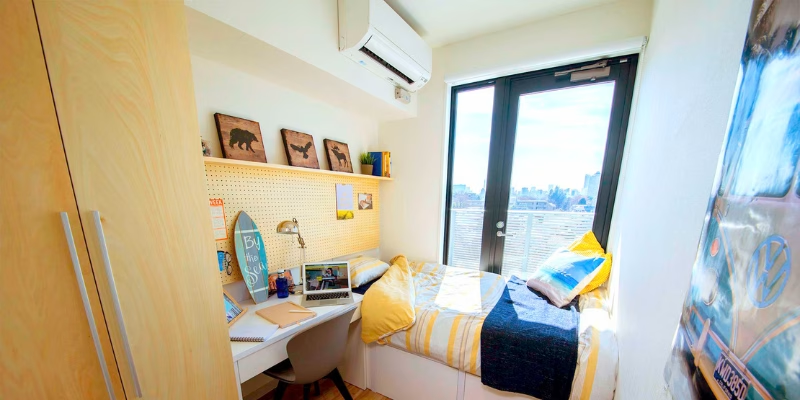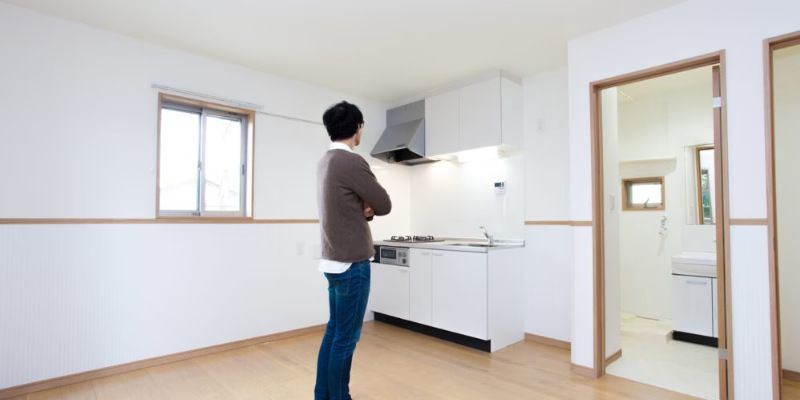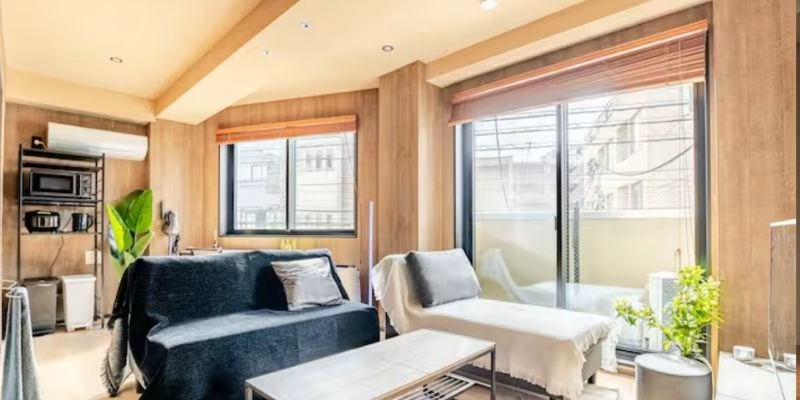Student housing Japan is a critical starting point for thousands of international residents. Still, finding stable accommodation is often the most complex administrative and financial hurdle. This is true for all foreigners planning to live, study, or work in the country. The traditional rental market is notorious for its unique rules. It requires high upfront costs and shows a general reluctance to engage with international tenants. This guide offers an in-depth perspective on the entire process. It dissects accommodation types and hidden costs. The guide also provides crucial strategies to help you successfully find your home. These strategies apply whether you’re searching for general accommodation or a rent apartment as a foreigner in Tokyo.
1. Practical Analysis of Common Housing Options and Strategic Planning
When looking for Student housing Japan, international students primarily choose among three models, each with distinct trade-offs regarding cost, privacy, and convenience.
1.1. Dormitories: Simplicity and Soft Landing
Dormitories are typically arranged through educational institutions, offering the easiest entry point to the Japanese housing market. They represent the simplest choice for new arrivals. This alternative often eliminates almost all administrative barriers and financial complexity linked to traditional leasing.
Key Advantages:
- Lowest overall starting cost and simplest procedure; often no guarantor needed.
- Convenient locations near campus, reducing commuting expenses.
- Ready-made social network with fellow international residents.
Critical Constraints:
- Extremely Limited Availability: The most significant drawback is that the number of available dormitory rooms is highly limited. Many universities only have enough capacity to house a small fraction of their international student body.
- Early Application is Mandatory: Students must apply for dormitory housing early. This is often required well before their official enrollment or admission acceptance. Missing this early deadline almost guarantees the student will need to seek private accommodation promptly upon arrival.
- Low privacy due to shared rooms or facilities.
- Strict house rules, curfews, or regulations apply.

1.2. Shared Houses: Flexibility and Low Barrier to Entry
The Shared House model has surged in popularity across costly urban centers. It has become particularly popular in Tokyo. This model offers a pragmatic solution for renters. It offers an excellent balance between personal space with a private room. It also gives a low financial commitment akin to a traditional long-term lease. This is often the most recommended starting point for those looking for Student Housing Japan. It is also a simple entry into the Tokyo rental market.
- Financial Edge (Shared House Tokyo) – Updated Data
- Extremely low first setup costs (often no Key Money or large security deposit).
- Rent Comparison: The national average for a private room is ¥40,000–¥50,000. Tokyo rent is higher compared to this, typically ¥50,000–¥60,000 for a private room. Dormitory/shared rooms typically range from ¥30,000–¥50,000.
- Utilities (electricity, water, gas, Wi-Fi) are typically bundled into a predictable, fixed monthly fee.
- Variety and Cost Savings
- Shared houses offer various room types: Dormitory (bunk beds, ¥30,000–¥40,000), Semi-private (curtains/partitions, ¥40,000–¥50,000), and private rooms.
- Rent is kept low because facilities like kitchens and bathrooms are shared. This reduces the space and maintenance costs factored into the rental price.
1.3. Private Apartments: Independence vs. Traditional Hurdles
Securing an unfurnished private apartment in Japan offers the greatest degree of freedom and privacy. Nonetheless, it presents the steepest financial and administrative climb for a foreigner. Pursuing this through the traditional market requires meticulous planning and a robust financial cushion.
- Primary Hurdles
- Exorbitant First Costs (often 4-6 months’ rent upfront). The national average monthly rent for an apartment is ¥51,000, but this rises to about ¥70,000 in Tokyo.
- Strict necessity for a Japanese Guarantor (hoshoˉnin) or a costly guarantee company.
- There is pervasive caution among traditional landlords towards international tenants. This attitude leads to high rejection rates for those seeking a rent apartment Tokyo foreigner.
Are you looking for the ultimate independence of a private studio? Click the link below to Arealty’s curated list of budget-friendly, foreigner-friendly, one-person apartments in Tokyo (1R, 1K, 1DK, 1LDK).
Browse Tokyo Studio & 1-Bedroom Apartments on AREALTY
2. Deciphering Financial Barriers: Hidden Costs and Savings Strategies
The financial expectations of the Japanese rental market are notoriously opaque. First costs far exceed the first month’s advertised rent. Understanding and preparing for these traditional fees is crucial for financial stability. It highlights the difference between the listed price and the significant cash needed to move in.
2.1. In-Depth Analysis of Initial Costs – Updated Comparison
The initial costs are the single largest financial hurdle of traditional Japanese rentals. These fees are statutory and must be factored in when calculating the true cost of an apartment in Japan.
- Initial Cost Comparison (Excluding First Month’s Rent)
- Private Rental: Typically requires 4 to 5 times the monthly rent (Shikikin, Reikin, Agency Fee, etc.), including furniture purchases.
- Shared House: Typically requires only 2 to 3 times the monthly rent. This includes deposit and key/admin fees. Many items are already furnished.
- Major Move-In Fees (Private Rental)
- Key Money (Reikin): Typically 1–2 months’ rent. A non-refundable “gift” to the landlord. Experts advise seeking “Reikin-nashi” properties.
- Security Deposit (Shikikin): Typically 1–2 months’ rent. Held for repairs, but full refund is rare.
- Agency Fee: Usually 1 month’s rent + tax.
2.2. Cost-Effectiveness of Shared House Fees
Shared houses offer lower rent. The fee structure of a shared house significantly reduces the financial burden compared to a private lease. The typical common service fee (Kyoˉekhi) in a shared house often includes utilities, which is a major advantage.
- Common Service Fee (Kyoˉekhi) Structure
- Included Utilities (Flat Rate): The Kyoˉekhi (often ¥10,000–¥20,000) covers all utilities such as water, gas, and electricity. It also includes internet. This provides a fixed monthly payment.
- Fixed Fee + Metered Utilities: The Kyoˉekhi is lower. Utilities are billed separately, often based on usage. There is a risk of fee increases.
- Usage Split: The entire house’s utility bill is divided among residents. This can lead to feelings of unfairness if lifestyles and usage differ significantly.
- Hidden Savings: The inclusion of consumables, like toilet paper and soap, in the service fee provides significant daily savings. Eliminating the need to buy large furniture and appliances offers long-term savings.

3. Overcoming Language and Legal Hurdles
The signing of a Japanese rental contract (Keiyakusho) is a highly formal process. It is conducted entirely in Japanese and involves complex legal terminology. Misunderstanding these clauses can lead to severe financial penalties and complicated legal situations, making expert advice indispensable.
3.1. Detailed Contract Analysis for Foreign Tenants
Tenants must scrutinize several crucial clauses within the contract. A lack of clarity on these points is where most foreigners face issues and unexpected costs down the line.
- Critical Contract Clauses
- Lease Term and Renewal Fees (Koˉshinryoˉ): Standard leases are 2 years. A renewal fee, often 1 month’s rent, is typically due every two years.
- Notice Period for Termination (KaiyakuYokoku): Most contracts need 1–2 months’ notice to end the lease. There are heavy penalties for earlier termination.
- Restoration Costs (GenjoˉKaifuku): A clear distinction is necessary. “Normal wear and tear” is the landlord’s responsibility. Damages due to “negligent use” are the tenant’s responsibility.
3.2. The Indispensable Role of Specialist Real Estate Services
Foreigners must focus on real estate companies that offer multilingual services. It is essential to guarantee transparency and protect their rights. They should also seek companies that have extensive experience with international clientele. These firms act as a critical buffer, clearly explaining contract details and negotiating with landlords.
- The Value of Expert Partnership
- A trustworthy professional will clearly articulate the nuances of Key Money. They will explain Shikikin and all administrative charges in the tenant’s native language.
- They streamline the process, helping clients secure apartments that align with the required rent in Tokyo without compromising legal safeguards.
4. Strategic Location Selection in Tokyo
Students need a clear financial picture and an understanding of the available housing types to successfully locate Student housing Japan.
4.1. Budget-Based Area Analysis
A strategic move often means accepting a slightly longer commute to secure a better price point. This analysis helps set realistic expectations for anyone seeking a rent apartment Tokyo foreigner.
- General Tokyo Area Tiers
- Central/Trendy Hubs (Shinjuku, Shibuya, Minato): Highest convenience, closest to business/school districts. Rent: ¥90,000 – ¥150,000+.
- Popular Commuter Belts (Nakano, Suginami, Setagaya): Good balance of amenities and value. Rent: ¥75,000 – ¥90,000.
- Economical Outer Wards (Itabashi, Adachi, Edogawa): Lowest rental costs, requires accepting longer commute times. Rent: ¥60,000 – ¥75,000.
4.2. The “Street Criteria” and Commute Strategy
When evaluating individual properties, tenants must assess the immediate surrounding environment. Practical convenience often outweighs minor rent differences.
- Key Location Criteria
- The “45-Minute Rule”: Limit the one-way commute to work or school to no more than 45 minutes to prevent burnout.
- Station Proximity: The ideal walking distance to a train station is under 10 minutes.
- Essential Amenities: The presence of essential amenities contributes to comfortable daily life. These include a supermarket (Suˉpaˉ), a convenience store (Konbini), and a station. They should be within a 5-10 minutes’ walk.

5. Why AREALTY is Your Best Partner for Student Housing Japan?
The complexities of finding Student housing Japan demand specialized support that traditional Japanese agencies often fail to provide. Arealty is the indispensable solution, committed to making the housing search utterly smooth, transparent, and stress-free for international residents.
Arealty understands the unique challenges faced by those seeking an apartment for rent in Tokyo Japan.
Arealty’s Core Strengths for Foreign Students:
- Multilingual Support: Breaking the Language Barrier Comprehensive support in multiple languages ensures clear communication, eliminating the primary source of stress and misunderstanding for foreign applicants.
- Foreigner-Friendly Properties: Guaranteed Access AREALTY offers access to a strong network of landlords who specifically welcome international clients. This includes properties with no-guarantor options and a robust selection of foreigner friendly apartments Tokyo, allowing you to bypass immediate rejection from standard agencies.
- Transparent & Comprehensive Assistance: Complete Peace of Mind The team explains all complex fees (shiki-kin, rei-kin) and contract terms upfront regarding your rent in Tokyo. They provide full guidance from property search and contract signing to crucial move-in support and utility setup.
- Hassle-Free Process & Local Expertise The customer-focused service ensures a smooth rental experience. With deep local expertise, Arealty provides insights on budget-friendly options, dramatically reducing the time and effort required to settle in Japan.
With Arealty, students navigating the complexities of apartments in Japan can proceed with confidence, knowing they have a dedicated professional team eliminating the common pitfalls.
| Contact AREALTY: | |
| Multilingual Hotline: | 050-6864-9697 |
| Website: | https://arealty.jp |
Conclusion
For international students, successfully finding Student housing Japan—whether a private apartment or a room in a shared house Tokyo—is the foundational step toward a fulfilling experience. The majority of students opt for the independence and growth opportunities afforded by private apartments, despite the high initial costs and procedural barriers.
Success depends critically on preparation, realistic budgeting, and, most importantly, partnering with a specialized real estate agency. By choosing Arealty, students gain access to a network of foreigner friendly apartments Tokyo and expert, multilingual guidance necessary to navigate the complexities of contracts and guarantor requirements. Choosing Arealty is the practical, stress-free choice for any student looking to secure their apartment for rent Japan and begin their Japanese journey on solid footing.






Leave a Reply